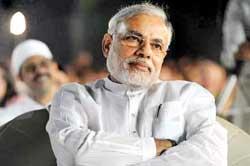Reply To:
Name - Reply Comment
Last Updated : 2024-04-25 20:04:00
Where the mind is without fear and the head held high
Where knowledge is free
Where the world has not been broken up into fragments by narrow domestic walls
Where words come out from the depth of truth........
Into that heaven of freedom, my Father, let my country awake.
- Rabindranath Tagore
 While the Sri Lankan government ignored the warning by India’s foreign intelligence agency of the possibility of Islamic terrorist attacks here, Indian Prime Minister Narendra Modi, it appears, is going to be an unexpected beneficiary of the Easter Sunday violence in Sri Lanka.
While the Sri Lankan government ignored the warning by India’s foreign intelligence agency of the possibility of Islamic terrorist attacks here, Indian Prime Minister Narendra Modi, it appears, is going to be an unexpected beneficiary of the Easter Sunday violence in Sri Lanka.
As the seven phased parliamentary elections of India are being held from April 11– May 19, the news of what happened in the island nation is likely to awaken the Indians, at least the informed urban population, to the perils of a weak political leadership and an unstable government. Interestingly, this group of voters generally form the traditional Congress support base. While poor economic performance is likely to be a matter of contention at the polls the events here no doubt would see millions reconsidering their decision to vote out the incumbent Prime Minister.
After all a victory for the Opposition led by Congress is bound to be saddled with a truck load of troubles. With its slew of PM aspirants who are likely to fight for premiership post-elections and dozens of emotionally blackmailing regional allies, the aftermath of the polls is going to be quite a nightmare for the Congress and the Gandhi family.
On the other hand an unstable government that is largely dependent on the unpredictable regional parties is the last thing an average Indian would want in the aftershock of a blistering terrorist attack on its neighbour by the Islamic terrorists. The Indians have had their share of terrorist attacks at regular intervals and the events in Sri Lanka certainly would have reminded them of their own days of tragedies.
Despite his recent electoral setbacks and mishandling of economy many consider Narendra Modi to be the most powerful Prime Minister of independent India. At the 2014 Lok Sabha polls, with Modi as PM candidate the BJP won 31% of the vote and with 282 seats it became the first party to win a parliamentary majority on its own since 1984. Ever since his election as PM until last December Modi’s Bharatiya Janata Party (BJP) continued to sweep polls.
After years of hibernation Congress showed signs of a comeback last December. The grand old party won the Hindu heartland states Madhya Pradesh, Rajasthan and Chhattisgarh at December assembly polls with disgruntled farmers siding with Congress against the BJP.
During the 2014 poll campaign and in the aftermath Narendra Modi’s propaganda machine went on to promote the BJP super star as a unifying leader to the sceptic western audience. Unfortunately instead of capitalizing on his wave of popularity to integrate the fractured nation Modi, an initial accused of Gujarat anti-Muslim violence, gradually started playing the Hindutva card much to the disappointment of the world. Prime Minister Modi’s appointment of a Hindu priest, Yogi Adityanath, as the Chief Minister of the strife-ridden Uttar Pradesh saw the ties between Hindus and Muslims reaching a new low.
If that’s not enough even during the ongoing poll campaign digs at Muslims had been a regular feature of the leading BJP candidates.
A few days back, widow of Sanjay Gandhi and BJP’s firebrand union minister Maneka Gandhi was quoted as saying that she was quite certain of her victory at the polls “with or without” the support of the Muslims in her electorate. She reminded the Muslims who form 17% of her base, Sultanpur in Uttar Pradesh, that they would need the support of the BJP to get their work done in future as BJP is likely to return.
As for Sri Lanka, which beat the world’s deadliest terrorist group ten years ago, something even the Indian forces failed to do, it would be just a matter of time before the security forces wipe out the fringe group of Islamic terrorists which does not command the support of its own community. They only need a stronger commander-in-chief to put the defence mechanism in order.

Add comment
Comments will be edited (grammar, spelling and slang) and authorized at the discretion of Daily Mirror online. The website also has the right not to publish selected comments.
Reply To:
Name - Reply Comment
US authorities are currently reviewing the manifest of every cargo aboard MV
On March 26, a couple arriving from Thailand was arrested with 88 live animal
According to villagers from Naula-Moragolla out of 105 families 80 can afford
Is the situation in Sri Lanka so grim that locals harbour hope that they coul